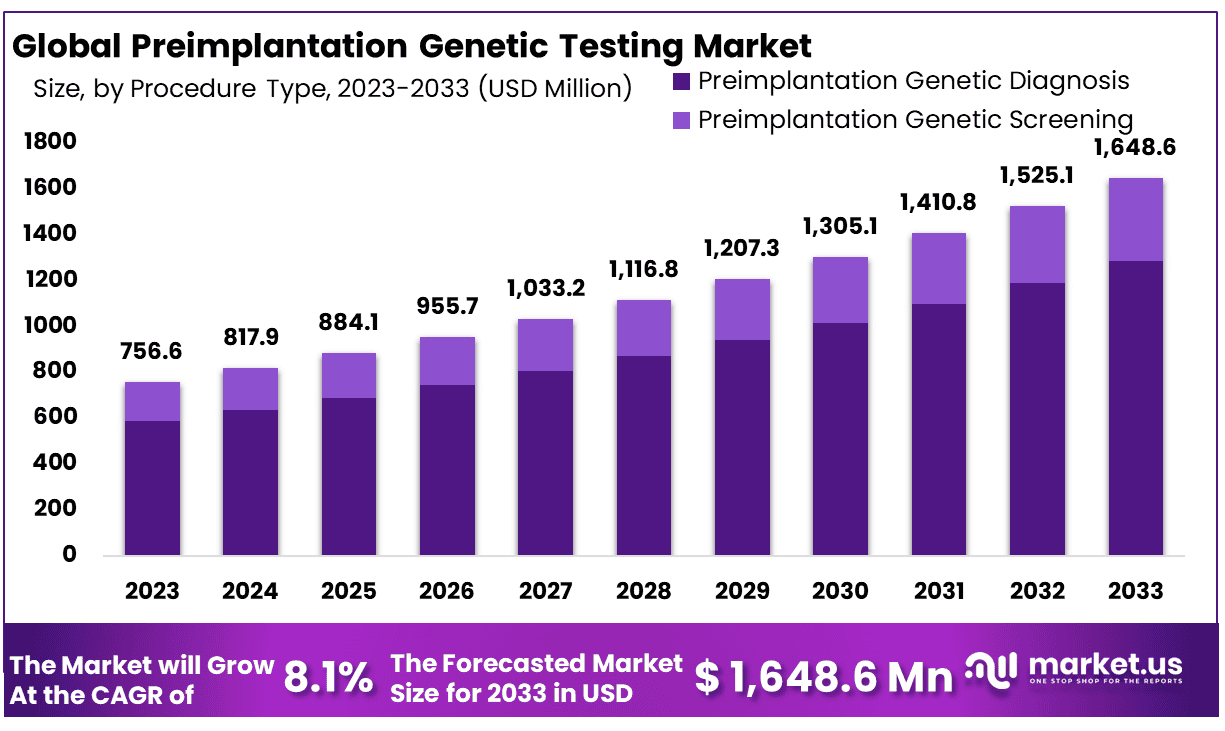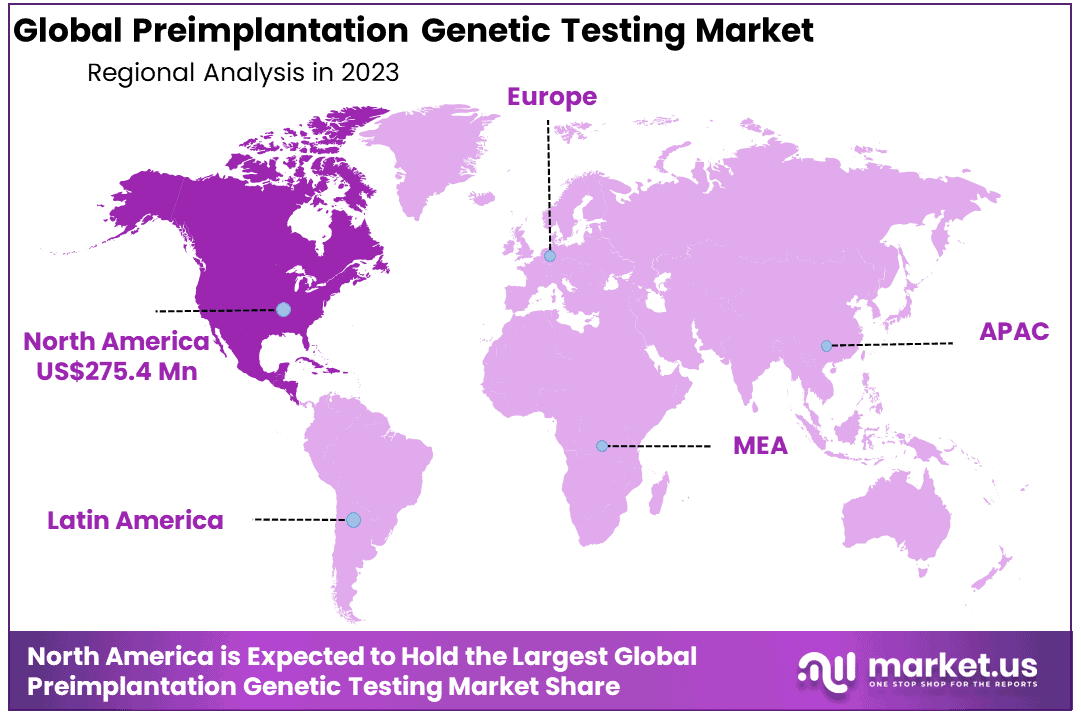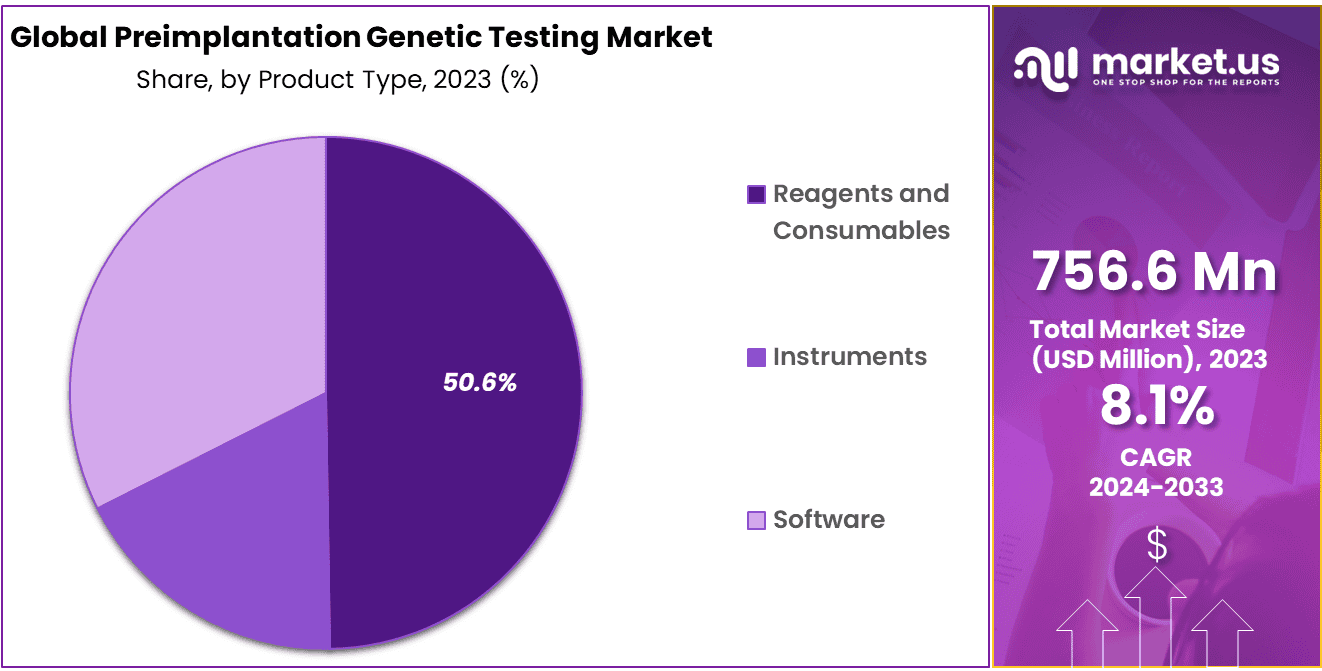New York, Dec. 13, 2023 (GLOBE NEWSWIRE) -- According to a recent report by Market.us, the Global Preimplantation Genetic Testing Market size is expected to be worth around USD 1,648.6 Million by 2033 from USD 756.6 Million in 2023, growing at a CAGR of 8.1% during the forecast period from 2024 to 2033.
Preimplantation genetic testing, or preimplantation genetic diagnosis, is a procedure performed during in vitro fertilization to screen embryos for genetic abnormalities before implanting them into a uterus. Medical professionals perform this screening to select healthy embryos for implantation into a uterus. The goal is to increase the chances of pregnancy while decreasing risks such as passing down genetic conditions to offspring.
Preimplantation requires several steps, beginning with collecting eggs from either the mother or donor and subjecting them to in vitro fertilization, leading to embryo creation. Preimplantation genetic testing then serves to select healthy embryos for final implantation - helping ensure maximum success while decreasing the inheritance of genetic conditions in offspring.
Don't miss out on business opportunities | Get sample pages at: https://market.us/report/preimplantation-genetic-testing-market/request-sample/

Key Takeaway
- Market Size & Growth: Preimplantation Genetic Testing Market size is expected to be worth around USD 1648.6 Million by 2033 from USD 756.6 Million in 2023, growing at a CAGR of 8.1%.
- By Procedure Type: In 2023, Preimplantation Genetic Diagnosis held approximately 78% of the market revenue share.
- By Product Type: In 2023, reagent & consumables represented 50.6% of revenue share.
- By Technology: Polymerase chain reaction (PCR) held the highest revenue share at 40.6% in 2023
- By Application: Aneuploidy screening dominated the preimplantation genetic testing market in 2023, accounting for 26.8% of its revenue share
- By End-User: The hospital segment accounted for the highest revenue share of around 40% in 2023
- Regional Analysis: North America secured 36.4% market share and contributed USD 275.4 Million in revenue in 2023.
Factors Affecting the Growth of the Preimplantation Genetic Testing Market
Various factors influence the growth of the preimplantation genetic testing market are;
- Rising Incidence of Genetic Disorders: With more genetic disorders and chromosomal abnormalities found in embryos than ever before, demand for Preimplantation Genetic Testing has seen exponential growth. PGT allows embryos without abnormalities to be selected before implanting and thus lowers the risk of inheriting conditions such as Down Syndrome.
- Expansion of Applications for PGT: PGT has quickly expanded into multiple areas, such as testing for single gene disorders, chromosomal abnormalities and aneuploidy screening - expanding its applications and driving market growth.
- Advancements in Genetic Screening Technologies: Ongoing advances in genetic screening technology continue to enhance its accuracy and efficiency for Preimplantation Genetic Testing, making it more accessible and reliable for couples undergoing assisted reproductive technologies.
- Rising Awareness and Acceptance: Raised awareness and acceptance of genetic testing contribute to an increase in demand for PGT as part of fertility treatments, with more individuals and couples becoming familiar with its benefits and becoming likely adopters of genetic tests.
- Rising Maternal Age: As more women delay childbearing and increase maternal age, the risk of chromosomal abnormalities increases exponentially. PGT testing to assess embryo health also rises exponentially as more women delay childbearing.
Regional Analysis
North America held an impressive market share of 36.4% for preimplantation genetics diagnosis (PGD), accounting for USD 275.4 million in revenue worldwide. This success can be attributed to an increase in healthcare expenditures as well as continued population growth within this industry sector.
Massachusetts, Columbia and New Jersey stand out with high rates of births resulting from assisted reproductive technology, underscoring their engagement and success with PGD solutions. North America plays an instrumental role in shaping the global PGD market landscape.
To understand how our report can make a difference to your business strategy, Inquire about a brochure at https://market.us/report/preimplantation-genetic-testing-market/#inquiry

Competitive Landscape
Industry players are expanding their presence in regional markets through various strategies, including product launches, acquisitions, and collaborations. These efforts aim to expand product development capabilities, optimize operational efficiencies, and broaden the market reach of participating businesses. By adopting such strategies, businesses in this industry are positioning themselves for sustained growth while simultaneously encouraging innovation within different regions and capitalizing on any opportunities presented by localized growth strategies.
Market Key Players
- Quest Diagnostics Incorporated
- Natera, Inc.
- COOPER SURGICAL, INC.
- Genea Pty Limited.
- Invitae Corporation
- Laboratory Corporation of America Holdings
- Thermo Fisher Scientific Inc.
- Bioarray S.L.
- Illumina, Inc.
- Hoffmann-La Roche Ltd
Scope of the Report
| Report Attributes | Details |
| Market Value (2023) | USD 156.6 Million |
| Forecast Revenue 2033 | USD 1,648.6 Million |
| CAGR (2024 to 2033) | 8.1% |
| North America Revenue Share | 36.4% |
| Base Year | 2023 |
| Historic Period | 2018 to 2022 |
| Forecast Year | 2024 to 2033 |
Market Drivers
The Preimplantation Genetic Testing (PGT) market is driven by the rising prevalence of genetic disorders and chromosomal abnormalities, creating increased demand for advanced screening technologies such as PGT. As couples undergo fertility treatments, PGT serves as a crucial tool to select embryos without genetic abnormalities that have the best chance of becoming successful pregnancies.
Advancements such as next-generation sequencing increase the accuracy and accessibility of PGT technology while rising maternal age increases demand as more women seek assisted reproductive technologies such as IVF or surrogacy services. Additionally, rising maternal age as women seek assisted reproductive technologies increases the need for PGT as more women seek assisted reproductive technologies from IVF/IVF technologies as assisted reproductive technologies become available to them.
Market Restraints
While Preimplantation Genetic Testing remains optimistic in its growth prospects, ethical concerns and misuse of genetic information continue to plague it. There has been debate surrounding selecting embryos based on certain genetic traits for screening; raising issues surrounding social and moral aspects.
Moreover, its high cost may restrict accessibility among certain population segments, creating obstacles to adoption. Therefore, ethical considerations as well as economic constraints act as roadblocks against widespread adoption of PGT technologies.
Market Opportunities
The Market presents attractive growth prospects due to increasing applications and technological advancement. PGT technology continues to expand its applications for multiple genetic conditions, such as single gene disorders and chromosomal abnormalities, further expanding its scope and potential uses. Technological innovations, including artificial intelligence and machine learning integration into genetic analysis, offer opportunities for more efficient and accurate PGT methods. Awareness and acceptance of genetic testing combined with supportive regulatory environments have created opportunities for market growth in reproductive healthcare and assisted reproductive technologies.
Furthermore, the growing trend towards personalized medicine and precision healthcare has only furthered PGT's significance, providing new market expansion possibilities in reproductive health and assisted reproductive technologies.
Immediate Delivery Available | Buy This Premium Research Report https://market.us/purchase-report/?report_id=12405
Report Segmentation of the Preimplantation Genetic Testing Market
Procedure Type Insight
Preimplantation Genetic Diagnosis (PGD) held 78% market share by revenue and was projected to experience the fastest compound annual growth rate from 2023-2024. Its expansion was spurred by increasing awareness among healthcare professionals and consumers regarding genetic testing for specific gene mutations; its expansion was propelled by rising incidence rates for single gene diseases and translocation cases as well as the successful implementation of Next-Generation Sequencing (NGS) technology.
PGD services provide essential gene mutation detection for newborns, helping reduce cases of genetic diseases in this way. Preimplantation Genetic Screening (PGS) services focus on screening embryos for chromosomal abnormalities; PGS screening services may be particularly recommended to couples experiencing advanced reproductive age, multiple In Vitro Fertilization cycles or repeated miscarriages or pregnancy losses. Due to increased demand and technological advancements within IVF procedures, Preimplantation Genetic Screening services stand poised for lucrative expansion; especially within large laboratories conducting multiple processes ensuring superior PGS services while increasing this segment's reach.
Product Type Insight
Reagents and consumables accounted for 50.6% of revenue in 2023, and are expected to experience the fastest compound annual growth rate between now and 2033. With IVF processes using Preimplantation Genetic Testing (PGT) contributing over 2.7 million cycles annually and over 500,000 IVF deliveries, the surge in PGT-related consumable demand drives sustained expansion - including next-generation sequencing tests such as polymerase chain reaction or fluorescent in-situ hybridization; creating further demand.
Instruments held the second-highest market share in 2023, due to persistent efforts among market players to create advanced genetic testing instruments with accurate results. As IVF services become more readily available at hospitals and clinics, on-site preimplantation genetic testing (PGT) services should become more in demand during pregnancies requiring PGT services requiring PGT. With such increasing availability comes increased demand for on-site PGT testing during pregnancies requiring PGT services requiring on-site services; thus creating opportunities for substantial market expansion over the coming years.
Technology Insight
Polymerase Chain Reaction (PCR) captured a 40.6% revenue share in 2023 due to its wide adoption, cost-effectiveness, and precision. These factors also help explain its dominating market presence as PCR tests can generate multiple copies of specific genomic segments to increase detection of chromosomal abnormalities; as well as providing excellent genetic diagnostic capabilities with specificity and sensitivity that make PCR ideal for various genetic diagnoses.
Next-generation sequencing (NGS) is projected to experience one of the fastest compound annual growth rates due to its superior accuracy over other tests and rapid sequencing of large amounts of DNA. Technological advancements have broadened NGS' scope, enabling additional chromosomal abnormalities to be identified and detected - making NGS stand out as an efficient and expanding form of genetic testing.
Application Insight
Aneuploidy screening dominated the preimplantation genetic testing market in 2023, accounting for 26.8% of revenue share, and is expected to experience an unprecedented compound annual growth rate throughout its forecast period. Widely utilized for embryo quality evaluation during In Vitro Fertilization (IVF), its projected expansion is driven by increasing adoption as well as new product innovation.
HLA Typing held the second-highest market share in 2023, due to its wide use in preimplantation genetic testing - specifically embryo HLA typing for stem cell therapy. HLA testing plays a vital role in preimplantation genetic testing by providing higher survival rates compared with transplantation from unrelated donors, further contributing to its market dominance.
End-User Insight
In 2023, hospital revenue shares reached around 40% due to factors including substantial patient influx, enhanced healthcare infrastructure, and the availability of IVF services across public and private hospitals. Couples seeking fertility treatments often opt for hospitals due to the advanced technologies they provide; additionally, research activities within hospital settings are projected to boost testing rates further; projections show the hospital sector will experience the fastest growth over the coming years, further cementing its role in supporting increasing demands for fertility treatments and preimplantation genetic testing services.
Recent Developments in the Preimplantation Genetic Testing Market
- February 2023: Illumina, Inc.Announced a partnership with CooperSurgical to develop and commercialize a new PGT-A test.
- April 2023: Thermo Fisher Scientific Inc. Received FDA approval for its Ion Torrent Genexus System, which is a next-generation sequencing (NGS) platform designed for PGT applications.
- June 2023: Invitae Corporation Launched a new carrier screening test that includes analysis for more than 300 genetic conditions.
- September 2023: Natera, Inc. Received FDA approval for its Panorama PGT-M test, which is the first non-invasive prenatal test (NIPT) for single-gene disorders.
- October 2023: Quest Diagnostics Incorporated Launched a new PGT-A (preimplantation genetic testing for aneuploidy) test that uses next-generation sequencing (NGS) technology to analyze embryos for chromosomal abnormalities.
Want to Access the Statistical Data and Graphs, Request PDF Sample @ https://market.us/report/preimplantation-genetic-testing-market/request-sample/

Market Segmentation
Procedure Type
- Preimplantation Genetic Screening
- Preimplantation Genetic Diagnosis
Product Type
- Reagents and Consumables
- Instruments
- Software
- Technology
- Next Generation Sequencing (NGS)
- Polymerase Chain Reaction (PCR)
- Fluorescent In-Situ Hybridization (FISH)
- Other Technologies
Application
- Chromosomal Abnormalities
- Aneuploidy Screening
- X-linked Diseases
- Embryo Testing
- HLA Typing
- Other Applications
End-User
- Hospitals
- Fertility Centers
- Diagnostic Centers
- Research Centers and Academic Labs
By Geography
North America
- The US
- Canada
- Mexico
Western Europe
- Germany
- France
- The UK
- Spain
- Italy
- Portugal
- Ireland
- Austria
- Switzerland
- Benelux
- Nordic
- Rest of Western Europe
Eastern Europe
- Russia
- Poland
- The Czech Republic
- Greece
- Rest of Eastern Europe
APAC
- China
- Japan
- South Korea
- India
- Australia & New Zealand
- Indonesia
- Malaysia
- Philippines
- Singapore
- Thailand
- Vietnam
- Rest of APAC
Latin America
- Brazil
- Colombia
- Chile
- Argentina
- Costa Rica
- Rest of Latin America
Middle East & Africa
- Algeria
- Egypt
- Israel
- Kuwait
- Nigeria
- Saudi Arabia
- South Africa
- Turkey
- United Arab Emirates
- Rest of MEA
Browse More Related Reports
- Photodynamic Therapy Market size is expected to be worth around USD 5.0 Billion by 2032 from USD 2.3 Billion in 2022
- Transplant Diagnostics Market size is expected to be worth around USD 8.3 Billion by 2032 from USD 4.2 Billion in 2022
- Digital Biomarkers Market size was worth USD 2.8 billion. It is estimated to reach USD 18.77 billion in 2032
- Mammography Market size is expected to be worth around USD 6,165 Million by 2032 from USD 2,500 Million in 2022
- Urinalysis Market size is expected to be worth around USD 8.4 Billion by 2032 from USD 4 Billion in 2022
- Urinalysis Market size is expected to be worth around USD 8.4 Billion by 2032 from USD 4 Billion in 2022
About Us:
Market.US (Powered by Prudour Pvt Ltd) specializes in in-depth market research and analysis and has been proving its mettle as a consulting and customized market research company, apart from being a much sought-after syndicated market research report-providing firm. Market.US provides customization to suit any specific or unique requirement and tailor-makes reports as per request. We go beyond boundaries to take analytics, analysis, study, and outlook to newer heights and broader horizons.
Follow Us on LinkedIn
Our Blog:
